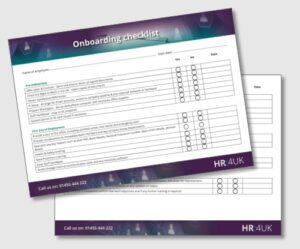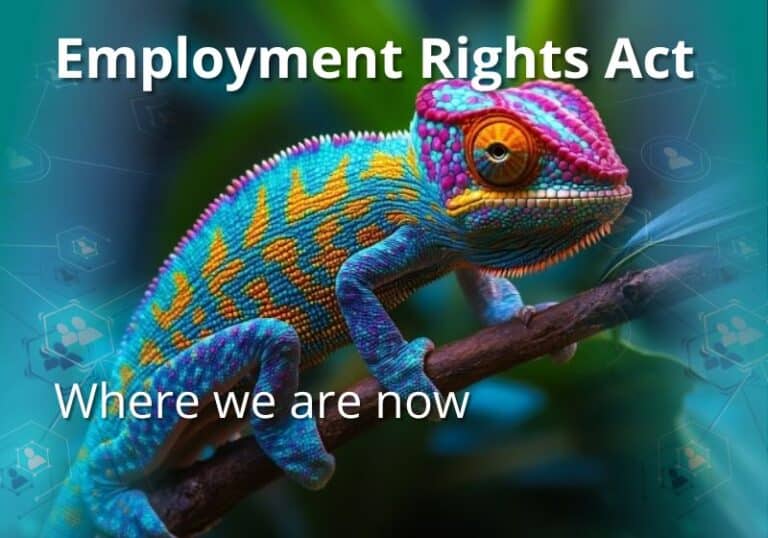Preparing for Day One Workers’ Rights

As a small business owner, you may often find yourself wearing many hats, one of which may involve managing your own recruitment process without the benefit of a dedicated HR department. In the current environment, where the Labour government’s proposals aim to grant workers day-one rights not to be unfairly dismissed, the significance of getting your recruitment process right from the outset has never been more important.
A well-structured recruitment process is no longer just about filling a vacancy; it’s about safeguarding your business in what is becoming an increasingly complex legal environment.
The Impact of Day-One Rights on Recruitment
The proposed Labour government’s changes to employment law will mean that from the very first day of employment, workers will have the right not to be unfairly dismissed. This shift is monumental, particularly for small businesses.
The cost of a poor hiring decision could become even more significant, with the risk of unfair dismissal claims becoming an immediate concern from day one. Recruitment will increasingly focus not only on skills but also on finding candidates who align with your workplace culture and demonstrate the right attitude towards work.
Gone are the days when you could hire almost anyone and take your chances, knowing that if it didn’t work out, you could simply terminate their employment without much consequence.
Your First Step to Attracting the Right Talent

The recruitment process begins long before the first interview; it starts with a compelling job advert that attracts the right candidates for your business. An effective job advert often represents the first interaction potential candidates have with your business. It will either be a good memorable experience or a poor one.
It is more than just a list of duties; it’s telling a story that communicates your company’s values, culture, and expectations—not only about the job itself but also about the kind of individual who will thrive within your organisation (both personally and professionally). This includes their approach to work, how they interact with others, and how well they align with the broader vision of your business.
The job advert will either resonate with applicants or it won’t, which is beneficial as it filters out unqualified candidates and attracts those who not only possess the necessary skills but also align with your business’s ethos and work environment.
Ultimately, getting the job advert right is the first step in a robust recruitment process as it ensures that by the time you reach the interview stage, you’re already engaging with candidates who are well-suited to thrive in your company.
The next step to a Structured Screening and Selection
This stage involves carefully reviewing applications to ensure that only the most qualified and culturally aligned candidates progress to the interview stage. Begin by establishing clear criteria based on the job description, including essential skills, qualifications, and behavioural attributes. Use these criteria to systematically evaluate each application, ensuring consistency and fairness throughout the process.
It’s also essential to be mindful of unconscious bias and discrimination during this phase; decisions should be based solely on the candidate’s qualifications and fit for the role, rather than any irrelevant factors.
If your company uses AI as part of the sorting process, exercise caution, as AI systems can inadvertently perpetuate biases if not properly calibrated and monitored.
Implementing blind screening techniques, where possible, can help mitigate bias and ensure a more diverse and inclusive selection process.
Once the initial screening is complete, consider preliminary assessments or phone interviews to further narrow down the candidate pool.
This step not only saves time but also allows you to focus your resources on those applicants who are most likely to succeed in your business.
The Next Step: Conducting an Effective Interview Process

This phase involves assessing candidate suitability and managing the logistics to ensure a smooth, professional experience for both parties. From inviting candidates to the interview, confirming their right to work, to finally conducting the interview itself, each step plays a vital role in the overall success of your recruitment process.
Inviting a Candidate to an Interview
This communication should be clear, professional, and include all necessary details to ensure the candidate is well-prepared. Provide the date, time, and location of the interview, along with the names and titles of the interviewers.
If the interview is virtual, include instructions for accessing the meeting platform.
It is also helpful to inform candidates about the interview format and any specific materials or tasks they should prepare. Providing these details upfront, you not only help the candidate prepare but also build rapport and strengthen the relationship from the outset, setting a professional tone and ensuring the interview process runs smoothly.
Confirming Right to Work Eligibility
Before proceeding with interviews, it’s advisable to confirm that candidates have the right to work in the UK. Conducting right to work checks at this early stage can save valuable time by ensuring that you only interview those who are eligible for employment.
This simple yet crucial step can prevent potential legal issues and streamline your recruitment process.
Conducting the Interview Effectively
Remember, the interview is not just an opportunity for you to evaluate the candidate; it’s also allows the candidate to assess whether your company, and you as a leader, are the right fit for them. This is your opportunity to showcase who you are as a company and what you stand for.
Being well-prepared not only sets you apart as an interviewer but also creates a positive experience for the candidate. To achieve this, thoroughly review the candidate’s application materials, familiarise yourself with the job description, and prepare a set of standardised questions that align with the key competencies required for the role.
Making sure you have a clear understanding of what you’re looking for in terms of both skills and cultural fit is essential. By approaching the interview with a structured plan, you’ll be able to engage confidently with the candidate, ask insightful questions, and ultimately make a more informed hiring decision.
Incorporating behavioural interview questions can provide deeper insights into how a candidate might perform in your business. Questions like, “Can you describe a time when you overcame a significant challenge at work?” help assess not just skills, but also attitudes, problem-solving abilities, and interpersonal skills.
Pay attention to red-flag responses, such as blaming others for past failures or a lack of self-awareness, which can indicate potential issues with accountability, teamwork, or adaptability.
Use questions that explore their values, work preferences, and approach to teamwork and conflict. Cultural fit doesn’t mean hiring people who are all the same, but rather finding individuals who align with your company’s core values and work environment.
You may want to consider, where possible, involving multiple people in the interview process to provide different perspectives and reduce the likelihood of individual bias. Consider having a panel interview or conducting multiple rounds with different team members.
During the interview, take detailed notes on the candidate’s responses as this will allow you to evaluate the candidate objectively based on the criteria established at the beginning of the process, focusing on how well their experience and answers align with the role’s requirements.
Depending on the nature of the role, you might also include practical assessments or task-based exercises as part of the interview process to gauge how the candidate will perform in the actual job.
The Final Step: Making the Decision and Extending the Offer

First, you’ll need to evaluate the interview results by reviewing your notes and comparing how each candidate measured up against the established criteria, taking into account both technical competencies and cultural fit.
Once you’ve identified the top candidate, it’s advisable to conduct reference checks to verify the information provided during the interview and gain additional insights into the candidate’s past performance and work ethic.
Next you can prepare a formal job offer that includes all relevant details, such as the job title, salary, benefits, start date, and any other conditions of employment.
If you are unable to get reference checks before you make the formal job offer, make sure that you make it a condition of your offer of employment that you receive satisfactory reference checks.
It’s important to ensure that the offer aligns with the candidate’s expectations, as discussed during the interview process, and be prepared for potential negotiations, particularly around salary and benefits.
Once the offer is finalised, extend it to the candidate in a timely and professional manner, either through a formal offer letter followed by a phone call or meeting to discuss the details. Convey your enthusiasm about the prospect of them joining your team, as this can positively influence their decision.
Allow the candidate time to review the offer and make their decision, and be available to answer any questions they may have during this period. Remember that the candidate is also assessing whether your company is the right fit for their career goals and personal circumstances.
Download our free onboarding checklist

When the offer is accepted, proceed with the necessary on-boarding preparations without delay. Delays may negatively impact the positive experience the candidate has had so far in the process.
If they decline, take time to understand their reasons. Consider whether there’s room for negotiation or if you need to move on to your next choice.
Promptly inform the other candidates of your decision, providing feedback where appropriate to maintain a positive relationship and protect your company’s reputation.
Handling this phase with care and professionalism ensures a smooth transition from candidate to employee. It will set the stage for successful on-boarding and long-term retention.
Conclusion
By investing the time and effort to get it right from the start you can protect your business from potential legal challenges and lay the foundation for long-term success.
The importance of a robust recruitment process cannot be overstated. Take time in your hiring process!
Business owners must change their approach to recruitment and treat it as a strategic priority. The right hire can drive your business forward, while the wrong one can be costly in more ways than one.
For further help with your recruitment process contact our advisors here who will be happy to help.
Angela Clay
A qualified employment law solicitor and our managing director, Angela has unparalleled legal expertise and decades of experience and knowledge to draw from. She’s a passionate speaker and writer that loves to keep employers updated with upcoming changes to legislation, and is a regular guest speaker on BBC Leicester Radio.




